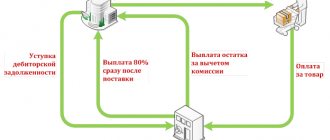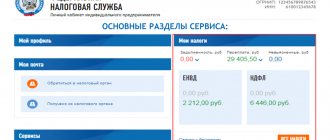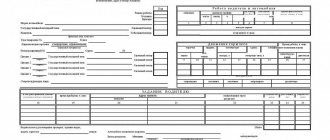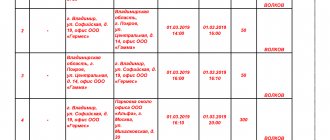Nuances of accounting for state duties in 2021-2022
State duty, according to Art.
13 of the Tax Code of the Russian Federation, is recognized as a collection at the federal level. Recently, no adjustments have been made to this area, therefore in 2021-2022, as before, an account is used to reflect accounts for its accrual and payment. 68 (subaccount “State duty”). Read more about the classification of taxes and fees in the Russian Federation here.
At the same time, the type of corresponding account when calculating state duty depends on its type. State duty may be paid in connection with:
- with the acquisition of certain property assets;
- carrying out business operations related to the main activities of the company;
- carrying out operations that are not related to its main activities;
- participation of the company in legal proceedings.
Let's look at how state duties are recorded and what transactions are necessary to record the operation to accrue the corresponding amounts in the listed situations.
You will find an algorithm for filling out the details of a payment order for payment of state duty in the Ready-made solution from ConsultantPlus. Get trial access and proceed to expert explanations.
Payment of state duty for registering a car with the traffic police
When registering a car with the traffic police, a state fee is paid before issuing documents (clause 4, clause 1, article 333.18 of the Tax Code of the Russian Federation). The amount of state duty for car registration is regulated by paragraphs. 36 clause 1 art. 333.33 Tax Code of the Russian Federation.
Find out more How to draw up a payment order for payment of state duty
Payment of the state fee for registering a car with the traffic police is documented in the document Write-off from the current account transaction type Payment of tax in the Bank and cash department - Bank statements - Write-off.
The document states:
- Date - the date of payment of the fee, according to the bank statement.
- According to document No. from - the number and date of the payment order.
- Tax - State duty for vehicle registration , selected from the Taxes and Fees directory and affects the automatic completion of the Debit Account .
- Type of liability - Tax .
- The recipient is the government body to which the duty is transferred, selected from the Counterparties directory, Type of Counterparty State Body . PDF
- Reflection in accounting : Debit account - 68.10 “Other taxes and fees.”
- Types of payments to the budget - Tax (contributions): accrued / paid .
- Budget levels - Federal budget .
Postings according to the document
The document generates the posting:
- Dt 68.10 Kt - the state duty has been paid in connection with the registration of the car with the traffic police.
State duty charged when purchasing property: which accounting account is used
The state duty paid upon the acquisition (creation) of property objects relates to an increase in their actual value (clause 8 of PBU 14/2007, paragraph “z”, clause 10 of FBU 26/2020 “Capital investments”, clause 12 of FBU 6/2020 “Fixed assets” have been applied since 2022, clause 8 of PBU 6/01 “Accounting for fixed assets” was applied until the end of 2022):
Dt 08 Kt 68/state duty.
Such records will be used, for example, when paying state fees in connection with the registration of an acquired fixed asset.
ATTENTION! Since 2022, PBU 6/01 “Accounting for fixed assets” has become invalid. Instead, FSBU 6/2020 “Fixed Assets” and FSBU 26/2020 “Capital Investments” apply. ConsultantPlus experts explained in detail how to properly keep records according to the new standards. Get free demo access to K+ and go to the Ready Solution to find out all the details of this procedure.
Read about fixed asset accounting in this material.
Accounting for state duties in accounting: entries for transactions related to the main activity
In case of payment of state duty for certain actions necessary for carrying out the current work of the enterprise, its amount is charged to expenses for ordinary activities (clauses 5, 7 of PBU 10/99). Accounting for state duties will be structured in such a way that the debit of the entry for calculating state duties will include one of the expense accounts:
Dt 20 (25, 26, 44...) Kt 68/state duty.
Examples of such expenses: certification of the company’s working documentation and its copies, registration of contracts, certification of employee signatures, correctness of translation from one language to another, etc.
Is it possible to reflect in accounting the founder’s expenses for paying the state duty for registering a legal entity? The answer to this question was given by 2nd class adviser to the State Civil Service of the Russian Federation I. O. Gorchilina. Get free trial access to the ConsultantPlus system and get acquainted with the official’s point of view.
For information on the main cost items, see the material “List of the most frequently used cost items in accounting .
Some nuances arise when reflecting in accounting the state duty paid for licenses obtained for a certain period of time, usually for several months (for example, licenses for the retail sale of alcohol). Today there are several options for accounting for such state duty:
- Its amount can be written off as expenses at a time (letter of the Ministry of Finance of the Russian Federation dated April 12, 2013 No. 03-03-06/1/12248).
- There is also an opinion that such costs should be previously taken into account in the expenses of the future period, and only then they are written off as expenses (letter of the Ministry of Finance of the Russian Federation dated January 12, 2012 No. 07-02-06/5).
Then the following entries will be used in postings for the state duty for issuing a license:
Dt 97 Kt 68/state duty - state duty has been charged;
Dt 44 Kt 97 - part of the state duty is charged to expenses.
The last entry will be made in accordance with the procedure used by the company to account for future expenses, until the state duty on expenses is completely written off.
- There is also a position that such licenses form intangible assets (clause 3 of PBU 14/2007, clauses 4, 9, 17 IAS 38). In this case, the amount of state duty will be written off as expenses as depreciation:
Dt 08 Kt 60, 76 - the amount of the state duty for the license is included in the cost of the intangible asset;
Dt 04 Kt 08 - license has been capitalized;
Dt 44 Kt 05 - depreciation has been accrued.
IMPORTANT! For intangible assets with an indefinite useful life, depreciation is not charged (clause 23 of PBU 14/2007).
It is worth understanding that each of the listed methods of organizing accounting entries for state duty has its pros and cons. Of course, the chosen method of accounting for such expenses must be fixed in the company’s accounting policy.
Accounting for state duty for registering a car with the traffic police
Regulatory regulation
In BU, the state duty paid in connection with the purchase of a car:
- before registration as fixed assets, it is included in its initial cost and reflected according to Dt 08.04.1 “Purchase of components of fixed assets” (clause 8 of PBU 6/01, chart of accounts 1C);
- after that - into expenses for ordinary activities or other expenses, depending on the activity in which the OS is planned to be used (clause 5, 11 of PBU 10/99).
The NU duty takes into account:
- in the initial cost of the OS, if it was paid before its commissioning (clause 1 of Article 257 of the Tax Code of the Russian Federation, Letter of the Ministry of Finance of the Russian Federation dated 06/08/2012 N 03-03-06/1/295);
- for other (indirect) expenses if the state duty is paid later (clause 1 of Article 264 of the Tax Code of the Russian Federation, Letter of the Ministry of Finance of the Russian Federation dated July 24, 2018 N 03-03-06/3/51800). In this case, the amount of the state duty is recognized as a lump sum as expenses on the date of its accrual (clause 1, clause 7, article 272 of the Tax Code of the Russian Federation). Read more State duty for vehicle registration: The Ministry of Finance stands its ground
Learn how to correctly determine the date of registration of a car according to the BU and the date of its commissioning according to the NU
If the management plans to use the car on public roads, then it is necessary to register it with the traffic police before registering it as an OS and before starting its operation, since without state registration it will not be possible to operate the car for these purposes. Therefore, in our example, the state duty will be included in the initial cost in both BU and NU.
Accounting in 1C
Accounting for state duty costs is reflected in the document Transaction entered manually, transaction type Transaction in the Transactions - Accounting - Transactions entered manually section.
State duty accounting:
- Debit - 08.04.1 “Purchase of components of fixed assets”: account for accounting for the formation of the initial cost of fixed assets;
- Col. — not filled in: in quantitative accounting, 1 piece of non-current asset has already been accepted into the account on 08.04.1;
- Subconto 1 - Ford Mondeo car : a car registered with the traffic police;
- Subconto 2 - storage location of the fixed assets object - Warehouse , specified in the fixed assets receipt document;
- Subconto 3 - fixed asset receipt document, filled out only if the method for assessing inventories is FIFO. Analytics should be the same as when purchasing a car. PDF
- Credit - 68.10 “Other taxes and fees”;
- Amount — the amount of state duty;
- The amount of NU DT is the amount of state duty.
Accounting for state duties on transactions not related to the main activity
The state duty for carrying out actions not related to the main activity of the company should be charged to other expenses (clause 11 of PBU 10/99):
Dt 91.2 Kt 68/state duty.
Such an entry will be used, in particular, when calculating the state duty paid upon the alienation of certain types of assets (clause 11 of PBU 10/99).
The state duty paid for participation in the trial is taken into account in the same way.
For tax accounting of other expenses, see our material.
Calculation and payment of state duty: postings
In the records of payment of state duties in the postings, invoice correspondence is used. 51 and 68:
Dt 68/state duty Kt 51.
However, in practice there are often situations when the state duty is paid not from the company’s current account, but in cash through its representative. Are such actions legal? The answer to this question is given to us by the letter of the Department of Tax and Customs Tariff Policy of the Ministry of Finance of the Russian Federation dated 06/01/2012 No. 03-05-04-03/43, in which officials confirmed the competence of such actions. At the same time, when paying the state duty, it is necessary to attach documents to the payment receipt confirming that the funds paid belong to the company performing the action for which the state duty is charged. This may be a power of attorney for the representative, copies of constituent documents, an expenditure order for the issuance of cash to the representative to pay the state duty.
Accounting entries for payment of state duty in this case will have the following form:
Dt 71 Kt 50 - cash was issued for reporting to the representative;
Dt 20 (23, 25, 26, 44, 91.2) Kt 71 - reflects the amount of state duty paid.
Reimbursement of state duty by court decision: postings
The state duty can be not only paid, but also received by the company as part of legal costs. According to Art. 110 of the Arbitration Procedure Code of the Russian Federation and Art. 98 of the Code of Civil Procedure of the Russian Federation, all legal costs are recovered from the losing party. And since the state fee is part of the legal costs, the company that paid it when filing a claim in court (and won the case) can rightfully expect to be reimbursed by the losing party.
In this case, for state duty subject to receipt by a court decision, the accounting entries will look like this:
Dt 76 Kt 91.1 - state duty for reimbursement by court decision;
Dt 51 Kt 76 - reimbursement of state duty has been received.
What expenses are included in legal proceedings?
In accordance with the provisions of Article 101 of the Arbitration Procedure Code of the Russian Federation, legal costs consist of state fees and legal costs associated with the consideration of the case by the arbitration court.
The amount and procedure for paying state duty are established by the provisions of Chapter 25.3 of the Tax Code of the Russian Federation.
According to Article 333.16 of the Tax Code of the Russian Federation, a state duty is a fee levied on legal entities and individuals when applying to government bodies authorized in accordance with the legislation of the Russian Federation:
- for the performance of legally significant actions in relation to these persons.
The amount of the state fee depends not only on who files the claim (legal entity or individual), but also on the subject of the claim.
Thus, according to Article 333.21 of the Tax Code of the Russian Federation, in cases related to property disputes* considered in arbitration courts, the state fee is paid in the following amounts:
- up to 100,000 rubles - 4 percent of the claim price, but not less than 2,000 rubles;
- from 100,001 rubles to 200,000 rubles - 4,000 rubles plus 3 percent of the amount exceeding 100,000 rubles;
- from 200,001 rubles to 1,000,000 rubles - 7,000 rubles plus 2 percent of the amount exceeding 200,000 rubles;
- from 1,000,001 rubles to 2,000,000 rubles - 23,000 rubles plus 1 percent of the amount exceeding 1,000,000 rubles;
- over 2,000,000 rubles - 33,000 rubles plus 0.5 percent of the amount exceeding 2,000,000 rubles, but not more than 200,000 rubles;
*When filing a claim of a property nature, subject to assessment, at the price of the claim.
According to Article 103 of the Arbitration Procedure Code of the Russian Federation, the price of the claim is indicated by the applicant. Based on Article 106 of the Arbitration Procedure Code of the Russian Federation, legal costs associated with the consideration of a case in an arbitration court include:
- sums of money to be paid to experts, specialists, witnesses, translators,
- costs associated with on-site inspection of evidence,
- expenses for the services of lawyers and other persons providing legal assistance (representatives),
- expenses of a legal entity for notification of a corporate dispute if federal law provides for the obligation of such notification,
- other expenses incurred by persons participating in the case in connection with the consideration of the case in the arbitration court.
In accordance with paragraph 5 of the Resolution of the Plenum of the Supreme Court of the Russian Federation dated September 26, 1973. No. 8 “On judicial practice on the application of legislation on the collection of procedural costs in criminal cases”, other costs related to procedural costs should be understood as:
- expenses of the bodies of inquiry, investigation and court incurred during the proceedings, directly related to the collection and examination of evidence of the defendant’s guilt and provided for by the Code of Criminal Procedure of the Russian Federation.
In particular, these may include:
- compensation for the cost of things damaged or destroyed during investigative experiments or examinations;
- costs for reimbursement of expenses to persons presented for identification (except for the accused),
- and so on.
As can be seen from the above rules, the list of legal costs is “open”; accordingly, such costs can include all costs that are directly related to the consideration of the case by the court.
According to Article 107 of the Arbitration Procedure Code of the Russian Federation, experts, specialists, witnesses and translators are reimbursed for the expenses incurred by them in connection with their appearance in the arbitration court:
- for travel,
- for renting residential premises,
- related to living outside the place of permanent residence (daily allowance).
In addition, experts receive remuneration for the work they performed on behalf of the arbitration court, if this work does not fall within the scope of their official duties as employees of state forensic institutions.
Specialists receive remuneration for work performed by them on behalf of the arbitration court, unless they are advisers to the staff of a specialized arbitration court.
The amount of the expert's remuneration is determined by the court in agreement with the persons participating in the case and by agreement with the expert.
The translator receives remuneration for the work performed by him on behalf of the arbitration court.
The amount of remuneration for the translator is determined by the court by agreement with the translator.
Working citizens summoned to the arbitration court as witnesses are retained the average earnings at their place of work during their absence due to their appearance in court.
Witnesses who are not in an employment relationship receive compensation for their diversion from normal activities, taking into account the actual time spent, based on the minimum wage established by federal law.
In accordance with Article 108 of the Arbitration Procedure Code of the Russian Federation, money to be paid to experts and witnesses is deposited into the deposit account of the arbitration court by the person who filed the corresponding petition.
If the said petition is submitted by both parties, the required sums of money are contributed by the parties in equal parts.
Amounts of money due to experts, specialists, witnesses and interpreters are paid upon the performance of their duties.
Amounts of money due to experts and witnesses are paid from the deposit account of the arbitration court.
If the appointment of an examination and the calling of a witness were carried out on the initiative of the arbitration court, then (clause 3 of Article 109 of the Arbitration Procedure Code of the Russian Federation):
- payment for the services of a translator or specialist involved by the arbitration court to participate in the process,
- payment of daily allowances and reimbursement of expenses incurred by them in connection with their appearance in court,
- payment of sums of money to experts, witnesses,
is carried out at the expense of the federal budget .
As mentioned above, the provisions of Article 110 of the Arbitration Procedure Code of the Russian Federation provide for the reimbursement of legal costs to the person in whose favor the judicial act was adopted at the expense of the losing party.
If the claim is partially satisfied, legal costs are borne by the persons participating in the case in proportion to the amount of the satisfied claims.
It is necessary to take into account that, according to clause 2 of Article 110 of the Arbitration Procedure Code of the Russian Federation, the costs of paying for the services of a representative incurred by the person in whose favor the judicial act was adopted are recovered by the arbitration court from another person participating in the case, within reasonable limits .
As the Constitutional Court of the Russian Federation indicated in its Ruling dated December 21, 2004. No. 454-O:
“The obligation of the court to recover the costs of paying for the services of a representative, incurred by the person in whose favor the judicial act was adopted, from another person participating in the case, within reasonable limits, is one of the legal methods provided for by law, aimed against the unreasonable overestimation of the amount of payment for the services of a representative, and thus thereby - to implement the requirements of Article 17 (Part 3) of the Constitution of the Russian Federation.
That is why Part 2 of Article 110 of the Arbitration Procedure Code of the Russian Federation is essentially about the duty of the court to establish a balance between the rights of the persons participating in the case.
At the same time, when making a reasoned decision to change the amount of amounts collected to reimburse the relevant expenses, the court does not have the right to reduce it arbitrarily , especially if the other party does not object and does not provide evidence of the excessiveness of the expenses collected from it.”
In paragraph 3 of the Information Letter of the Presidium of the Supreme Arbitration Court of the Russian Federation dated December 5, 2007. No. 121
it is reported that:
“A person demanding reimbursement of expenses for the services of a representative proves their amount and the fact of payment; the other party has the right to prove their excessiveness.
At the same time, if the amount of the stated claim clearly exceeds reasonable limits, and the other party does not object to their excessiveness, the court, in the absence of evidence of the reasonableness of the expenses presented by the applicant, in accordance with Part 2 of Article 110 of the Arbitration Procedure Code of the Russian Federation, reimburses such expenses within reasonable limits, in its opinion , within."
Thus, the limit of “reasonableness” of the amount of expenses is determined solely by the court on the basis of the value judgment (opinion) of this very court.
It should be noted that the actual costs incurred by the winning company for the services of a law firm are not always accepted by the courts as “reasonable”.
At the same time, the Presidium of the Supreme Arbitration Court of the Russian Federation, in its Resolution dated July 24, 2012. No. 2598/12 came to the conclusion that the equality of the amount of expenses for protecting the interests of society to the amount of the protected property interest, or its excess does not indicate unreasonableness or excessiveness of such expenses , since the amount of the property interest is not a factor that in itself indicates reasonableness or excessiveness expenses incurred to defend it.
According to clause 3 of Article 110 of the Arbitration Procedure Code of the Russian Federation, the state duty, from payment of which the plaintiff was exempted in the manner established by the Tax Code of the Russian Federation, is recovered from the defendant to the federal budget in proportion to the size of the satisfied claims, if the defendant is not exempt from paying the state duty.
When the persons participating in the case agree on the distribution of legal costs, the arbitration court assigns legal costs to them in accordance with this agreement.
Unpaid or incompletely paid expenses for the examination are subject to recovery in favor of the expert or the state forensic institution from the persons participating in the case, in proportion to the amount of satisfied claims.
Please note: Legal costs incurred by persons participating in the case in connection with the consideration of the appeal and cassation complaint are also distributed according to the rules established by Article 110 of the Arbitration Procedure Code of the Russian Federation.
As established by Article 111 of the Arbitration Procedure Code of the Russian Federation, if a dispute arose as a result of a violation by a person participating in the case of a claim or other pre-trial procedure for resolving a dispute provided for by law or agreement, including:
- violation of the deadline for submitting a response to the claim,
- leaving a complaint unanswered,
the arbitration court assigns legal costs to this person regardless of the results of the consideration of the case.
The arbitration court has the right to attribute all legal costs in the case to a person who abuses his procedural rights or fails to fulfill his procedural duties, if this leads to:
- to disrupt the court hearing,
- to delay the legal process,
- to obstruct the consideration of the case and the adoption of a lawful and justified judicial act.
At the request of a person participating in the case who is entitled to reimbursement of legal expenses, the arbitration court has the right to reduce the amount of compensation if this person provides evidence of their excessiveness.
According to Article 112 of the Arbitration Procedure Code of the Russian Federation:
- issues of distribution and attribution of legal costs to a person who abuses his procedural rights,
- other questions about legal costs,
are resolved by the arbitration court in the same judicial act that ends the consideration of the case on the merits, or in a ruling.
If this does not happen, then a statement on the issue of legal costs incurred in connection with the consideration of the case:
- in the arbitration court of the first, appellate, cassation instances,
- consideration of the case by way of supervision,
may be filed with the arbitration court, which considered the case as a court of first instance , within six months from the date of entry into force of the last judicial act, the adoption of which ended the consideration of the case on the merits.
If the deadline for filing such an application is missed for a valid reason, it may be restored by the court.
The application on the issue of legal costs is considered according to the rules provided for in Article 159 of the Arbitration Procedure Code of the Russian Federation for consideration of the application.
Based on the results of consideration of such an application, a determination is made that can be appealed.
As can be seen from the above rules, not all amounts of expenses are reimbursed by the losing party.
In the Information letter of the Presidium of the Supreme Arbitration Court of the Russian Federation dated December 5, 2007. No. 121 states, for example, that bonuses to a representative who is an employee of an organization cannot be reimbursed at the expense of the losing party:
“The costs of paying a bonus to a representative working under an employment contract in the organization whose interests he represented in court are not subject to reimbursement, since they do not fall under the concept of legal expenses distributed in accordance with Article 110 of the Arbitration Procedure Code of the Russian Federation .”
In paragraph 10 of the same letter of the Presidium of the Supreme Arbitration Court No. 121, it is stated that the presence of one’s own legal service does not in itself prevent the reimbursement of legal expenses for the services of representatives.
At the same time, the services of lawyers for the pre-trial settlement of disputes do not count as legal expenses, since they are not related to the direct consideration of the case in court, and, accordingly, are not subject to reimbursement (Resolution of the Presidium of the Supreme Arbitration Court of the Russian Federation dated December 9, 2008 No. 9131/08).
The amount of payment for consultations not provided for in the agreement on representation in court is not included in court costs (clause 8 of letter No. 121).
They may also refuse to reimburse expenses for a representative if his services have not yet been paid in full, since expenses actually incurred are subject to reimbursement (clause 4 of letter No. 121).
At the same time, according to paragraph 5 of letter No. 121, the fact of payment for the representative’s services by a third party (who is not a party to the case) in the order of mutual settlements with the applicant is not a basis for refusing to satisfy the request for recovery of expenses for payment for the representative’s services.
How is state duty reflected in tax accounting?
All types of state duties in tax accounting are included in the category of other expenses. Moreover, it should be reflected at the time of accrual (subclause 1, clause 1, article 264 of the NKRF). For different circumstances, this moment may fall either on the date of payment, or on the date of registration documents, etc.
Thus, when registering any actions, the state duty is paid in advance, but it should be included in expenses only after the registration documents are accepted by the authorized body. But when paying the state fee for licensing, it is taken into account at the time of accrual (letter of the Federal Tax Service of Russia dated December 28, 2011 No. ED-4-3/22400). If the state duty is due to the purchase of non-current assets, then the amount of the state duty will be included in the initial cost of the objects, provided that it is paid before their acquisition. If after, then in the category of other expenses.
Calculation of state duty for postings in 1C 8.3
First, let’s figure out which accounting account to assign the state duty to in 1C 8.3.
Postings for state duty in accounting
In BU the duty paid for the purchase of a car:
- before registration as fixed assets, they are included in the initial cost and taken into account according to Dt 08.04.1 (chart of accounts 1C, clause 8 of PBU 6/01);
- after - to other expenses (according to Dt 91.02) or expenses for ordinary activities (according to Dt 20, 26, etc.), depending on the activity in which they plan to use the OS (clauses 5, 11 of PBU 10/99) .
Postings for state duty in tax accounting
In NU the duty is taken into account:
- In the original cost of the fixed assets, if the duty was paid before commissioning (Letter of the Ministry of Finance of the Russian Federation dated 06/08/2012 N 03-03-06/1/295, clause 1 of Article 257 of the Tax Code of the Russian Federation);
- In other (indirect) expenses, if the state duty was paid later (Letter of the Ministry of Finance of the Russian Federation dated July 24, 2018 N 03-03-06/3/51800, clause 1 of Article 264 of the Tax Code of the Russian Federation). In this case, the amount of the duty is recognized as a lump sum in expenses on the date of its accrual (clause 1, clause 7, article 272 of the Tax Code of the Russian Federation). More details
Study this issue in more detail, based on a comprehensive analysis of current regulations and taking into account the latest legislative trends
Results
State duty - posting this payment in accounting has numerous features. The state duty can be attributed to expenses for core activities, other expenses or to an increase in the value of the asset.
When writing off state duty, postings are made using expense accounts in correspondence with the account.
68, to which the corresponding sub-account is opened. The fee for carrying out legally significant actions charged by private notaries is not a state duty, therefore, when carrying out such business transactions in accounting, invoice. 68 is not used. You can find more complete information on the topic in ConsultantPlus. Free trial access to the system for 2 days.







